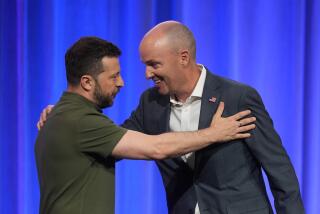Cheney affirms ties with Georgia, assails Russia
TBILISI, GEORGIA — Appearing alongside beleaguered Georgian President Mikheil Saakashvili, Vice President Dick Cheney on Thursday criticized Russia’s conduct in its short war with Georgia and pledged to continue American support for reconstruction and humanitarian aid.
Cheney’s visit to Tbilisi was the highlight of a quick swing through the Western-friendly nations of Azerbaijan, Georgia and Ukraine, all former Soviet republics. The trip apparently was designed to shore up the morale of national leaders rattled by Russia’s rout of U.S.-trained Georgian forces.
“Russia’s actions have cast grave doubt on Russia’s intentions and on its reliability as an international partner, not just in Georgia, but across this region and indeed throughout the international system,” Cheney said. “America will do its duty to work with the governments of Georgia and our other friends and allies to protect our common interests and uphold our values.”
Cheney’s remarks probably will further inflame Moscow, where officials have railed against the United States’ alliances with the former Soviet states. This week, President Dmitry Medvedev said bluntly that Moscow expected to maintain a “privileged” sphere of influence in the region of the former Soviet Union.
However, U.S. officials Thursday brushed off criticism that the White House is deliberately approaching the brink of confrontation with Russia.
“The United States is not trying to paint Russia as an enemy,” said Robert A. Wood, a State Department spokesman. “We’re very concerned about its behavior and what that means for the future of the U.S.-Russia relationship. We’re looking at all aspects of our relationship with Russia, in terms of how we go forward.”
Russian officials also have been dismayed by the apparent staying power of Saakashvili, often referred to in Moscow as a “war criminal” for launching the military operation in early August in the breakaway province of South Ossetia. Russia responded by sending in troops to defend the pro-Russian enclave, which broke with Georgia’s government more than a decade ago. The fighting ended with Russia continuing to occupy parts of Georgia proper to enforce the separation from South Ossetia and another breakaway region, Abkhazia.
Russian Foreign Minister Sergei Lavrov said this week that the world should impose an arms embargo on Georgia until Saakashvili is out of power.
Georgian officials have said the United States will help rebuild the country’s crushed military. But that was not directly affirmed during Cheney’s visit, which came a day after President Bush said the U.S. would provide up to $1 billion in nonmilitary assistance.
“After your nation won its freedom in the Rose Revolution, America came to the aid of this courageous young democracy,” Cheney said, referring to the nonviolent uprising in 2003 that put Saakashvili in power. “We are doing so again as you work to overcome an invasion of your sovereign territory, and an illegitimate, unilateral attempt to change your country’s borders by force that has been universally condemned by the free world.”
Administration officials, when asked about the possibility of future military assistance to Georgia, said “potential future needs” were being assessed.
Though the Georgian government is eager to rebuild its battered military, Saakashvili said Georgia would try its “best to avoid violence” in the future.
Cheney also reiterated that “America is fully committed to Georgia’s membership action plan for NATO and to its eventual membership in the alliance.”
“Now it is the responsibility of the free world to rally to the side of Georgia,” the vice president added.
In Washington, the White House said the conflict had strengthened U.S. determination to bring Georgia and Ukraine into the North Atlantic Treaty Organization.
Cheney’s visit, said Georgian political expert Alexander Rondeli, demonstrated “the United States’ full support of Georgia and its president.
“The vice president marked the big importance of the energy corridor that runs on the Georgian territory,” he said, “and the corridor remains in the sphere of interests of America and Western countries.”
More to Read
Sign up for Essential California
The most important California stories and recommendations in your inbox every morning.
You may occasionally receive promotional content from the Los Angeles Times.










